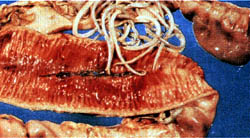Equine De-worming Program
A good worming program is important for all horses. Here are some factors to consider when reviewing a worming program with your veterinarian:

- Movement of horses on and off the farm
- Density of horses in the paddocks
- Resistance of worms in your paddocks
- Steps to prevent introduction of resistant worms
New Developments
Fecal Egg Counts
Fecal egg counts should be run intermittently on all horses. It has now been shown that horses have a considerable variation in resistance to worms. Most adult horses (80%) have low fecal egg counts, good resistance to worms and rarely need to be dewormed. The other 20% have poor resistance, high fecal egg counts, and contribute the majority of the worm burden to the pasture. These horses need a frequent deworming program. Fecal egg counts run after dewoming are useful to determine how effective each of the deworming products are on a farm.
Ascarid Impactions (Roundworms)
There have been several reports of severe ascarid impaction in weanling foals during the last year. Some of these have led to the death of the foal. There has also been two reports of possible Ivermectin resistance to Ascarids. This presents a growing concern for horse owners, and veterinarians and you should discuss it with your veterinarian.
Ivermectin
Ivermectin is a de-wormer with broad spectrum activity and minimal resistance reported. Recent evidence suggests that there may be Ascarid resistance developing. However, it remains highly effective against large and small strongyles, pinworms, bots, threadworms and onchocerca. (It has no effect on Tapeworms).
Moxidectin
It belongs to the same avermectin family as Ivermectin with broad spectrum activity and minimal resistance. It will probably share a lot of the resistance and susceptibilities of Ivermectin. It has longer efficacy and is effective against the developing, encysted mucosal larvae of small strongyles (cyathastomes). It is claimed to suppress the strongyle egg counts for up to 84 days following a single administration. Caution:. It is important that the correct dosage of Moxidectin is administered to your horse, as toxic effects can be seen at as little as 2 times the recommended dose. Toxic signs include drowsiness, depression and ataxia and manifest themselves at 8 to 24 hours post treatment. Body fat also has a significant influence on the metabolism of moxidectin. Therefore caution should be used in administering it to young foals, thin racehorses, and other debilitated horses who have low body fat. Because of the toxicity, the necessity to ensure that the dosage is correct and that the horse has sufficient body fat, HVS recommends that Moxidectin only be administered under the supervision of a veterinarian.
Fenbendazole
Fenbendazole is a member of the benzimidazole family. It has a moderate spectrum of activity, with efficacy against large and small strongyles, pinworms and ascarids. Unfortunately, worms have developed some resistance to this family, so monitoring of the program with fecal exams becomes even more important.
Praziquantal
Praziquantal is used in combination with other dewormers to target Tapeworms. It is much cheaper than a double dose of Strongid and still quite effective.
Pyrantel Pamoate
This is used, at a double dose, in rotation with Ivermectin, Moxidectin and Benzimidazoles to control tapeworms which the others are not effective against. Tapeworms can cause diarrhea, poor growth and colic. They are particularly damaging to younger horses. Pyrantel pamoate is effective against tapeworms, pinworms, large and small strongyles, ascarids, and threadworms. However, it has no effect on bots. Unfortunately, Pyrantel pamoate has had several verbal reports of resistance reported against tapeworms and several types of small strongyles.

